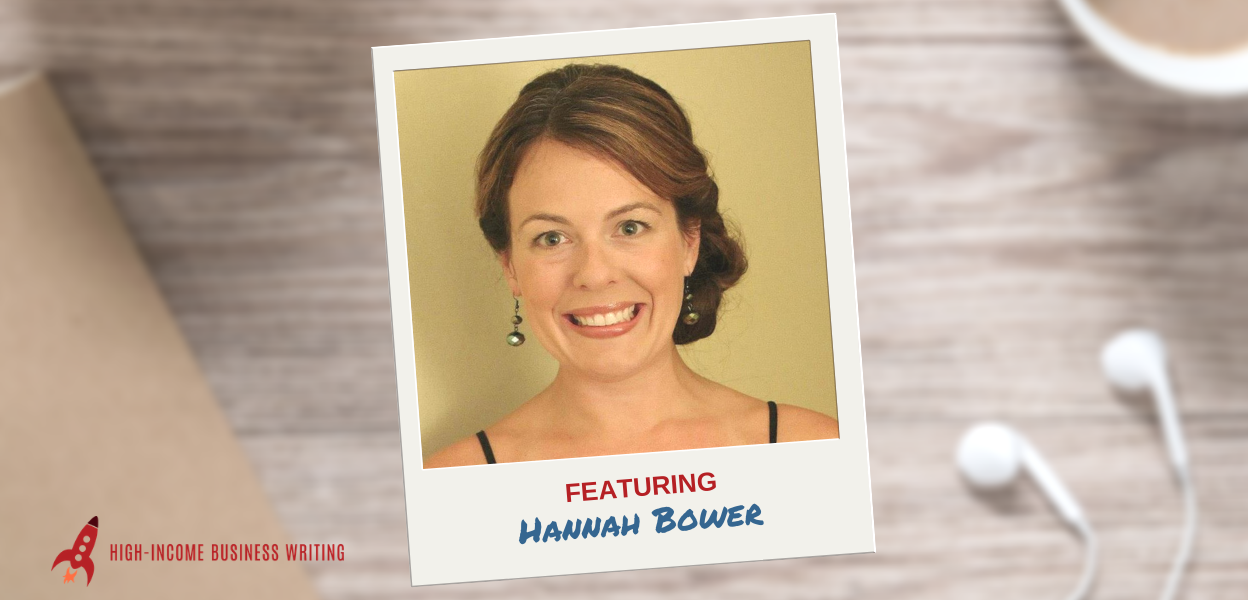Writers often ask me about PR (public relations) work and what it involves.
Sometimes they ask because a client has requested this kind of work.
Other times, they wonder if it’s something they should add to their suite of services.
If that’s you, you’ll really enjoy today’s episode because my guest has a unique perspective on the topic.
Hannah Bower is a content marketing writer and strategist based in Atlanta, Ga. Her background is in PR. When she launched her freelance business in 2004, that’s the kind of work she did for clients.
But as the world of PR started to change rapidly a few years ago, she began shifting to content marketing work. Today, content marketing is now her sole focus.
In this conversation, you’ll learn what freelance PR work entails, and how it’s changed over the past 15 years.
You also learn why Hannah decided to get out of it, and how she’s become a successful writer and strategist with a 100% referral-based business.
The notes that follow are a very basic, unedited summary of the show. There’s a lot more detail in the audio version. You can listen to the show using the audio player below. Or you can subscribe in iTunes to get this show delivered straight to the Podcasts app on your smart phone, tablet or iPod.


High-Income Business Writing with Ed Gandia
#183: Hannah Bower on Freelancing as a PR Professional — and Why She Eventually Moved to Content Marketing
Tell us about yourself and your business
Hannah is a freelance writer and content marketer who started her own business about 15 years ago. She works primarily with companies in the B2B space.
She likes working with companies that use technology to serve complex problems. Some companies struggle to articulate the problems they solve as well as their solutions, and she likes helping them crystalize their message.
When she launched her business, Hannah only did PR. But she has since changed course to focus solely on content creation and strategy.
What caused you to change course from PR to content management?
When Hannah entered the workforce around 1999, she worked for a PR agency.
At the time, technological innovations were fundamentally changing how people communicated. It was middle of the dotcom boom.
It was exciting time! There was a huge appetite for information and a better understanding of the implications of these advancements.
Things in the media industry started to shift. More and more content moved online. Subscription revenues plummeted. The business model for the publishing industry fell apart.
Lots of good journalists who understood technology left and were replaced by people with less experience. These new people were under tremendous to pressure to push out short form content. They were measured by clicks and shares.
As a result, it was harder for Hannah to get quality coverage for her PR clients. To succeed, she needed to be plugged in all the time, and she was burning out.
At the same time, technology companies were shifting larger portions of their budget from PR to content marketing. New opportunities emerged.
This was a happy coincidence. Hannah had always enjoyed the writing aspect of her job. Now she could use it to deliver results to her clients through content marketing — better results than she could get through PR.
What would it take for someone who’s interested in PR to become successful in it today as a solo professional?
Today, there are good opportunities in PR for solo professionals. It’s hard to find good technology PR professionals who work for themselves.
It’s demanding work. The speed of communication isn’t slowing down.
You need to pay attention to what’s happening on social media. What’s the conversation? Who are the influencers? What’s noise and what’s important? How should you respond?
Why do some companies prefer to work with a solo PR person?
Not every company has the budget for a large agency. And they may not need a large scope of services.
Some like working with an independent practitioner because they have more direct communication. They don’t like working with a giant account team that can have lots of turnover.
When the company is only working with one PR person, it’s easier to bring that person into the fold and embed them with the company. The PR person can really understand the company’s needs.
You provide content marketing strategy to your clients. How does it fit with your other services?
Hannah integrates strategy into her other services. In B2B, it’s hard to think about content without thinking about how it’s going to be used.
It’s hard to think about content without thinking about how it will be used.
She’ll sit down with new clients and look at their sales cycles. In the B2B tech space, the sales cycle can be eight to 18 months. To keep prospects engaged over that long duration of time, you have to understand what content to share and when.
Each stage of the cycle requires a different type of content. You need to understand common objections and how to neutralize them. Then you have to decide how to share that content.
The writing component is actually the easiest part.
So how often are you contacted by prospects looking for a specific piece of content versus prospects who are looking for something more comprehensive?
It’s about 50-50. If the CMO or a marketing executive contacts her, they’re looking for a plan.
Usually, she’s brought in early in the process so she can help shape strategy and direction.
Clients that are looking for a one-off piece of content raise a red flag. That doesn’t mean they’ll be bad clients, but they may not see the value in what she offers. She may need to educate them.
Hannah tends to lead with content execution and strategy. When you talk about content from that place, it opens the clients’ eyes. It’s about more than just an immediate need.
This positioning attracts the types of companies she likes to work with.
How to you get most of your prospects?
Hannah’s business is 100% referral based. She has a good network.
It’s a lot easier to close deals when a prospect has been referred to you. They’re already partly sold!
When a prospect is referred to you, they’re already partly sold.
She’s also fairly targeted (i.e. B2B technology companies). These companies need writers who know how to write for technology companies. So the pool is smaller.
Where can listeners learn more about you?
Hannah’s website
https://www.bower-communications.com
By the way … whenever you’re ready, here are 4 ways I can help you grow your freelance business:
1. Grab a free copy of my book for ESTABLISHED writers/copywriters.
You’ll discover how to quickly and predictably reawaken dead leads, generate new client opportunities and convert not-yet-ready prospects into freelance writing clients. — Click Here
2. Download a free copy of my new book for writers who are NEW to freelancing.
I’ll show you the 3 things you need to do to get your business off the ground safely and land your first paying client faster. — Click Here
3. Join my implementation program and be a case study.
I’m putting together a new implementation group this month. If you’d like to work with me to grow your income quickly with better clients (and become one of my new success stories). Just email me at ed@b2blauncher.com and put “Case Study” in the subject line.
4. Get a 1:1 strategy call with me.
Are you a 6-figure writer who’s trying to earn more in less time with less stress? Let’s jump on a quick call and brainstorm some ideas for getting you there. Just email me at ed@b2blauncher.com and put “Brainstorm” in the subject line.






